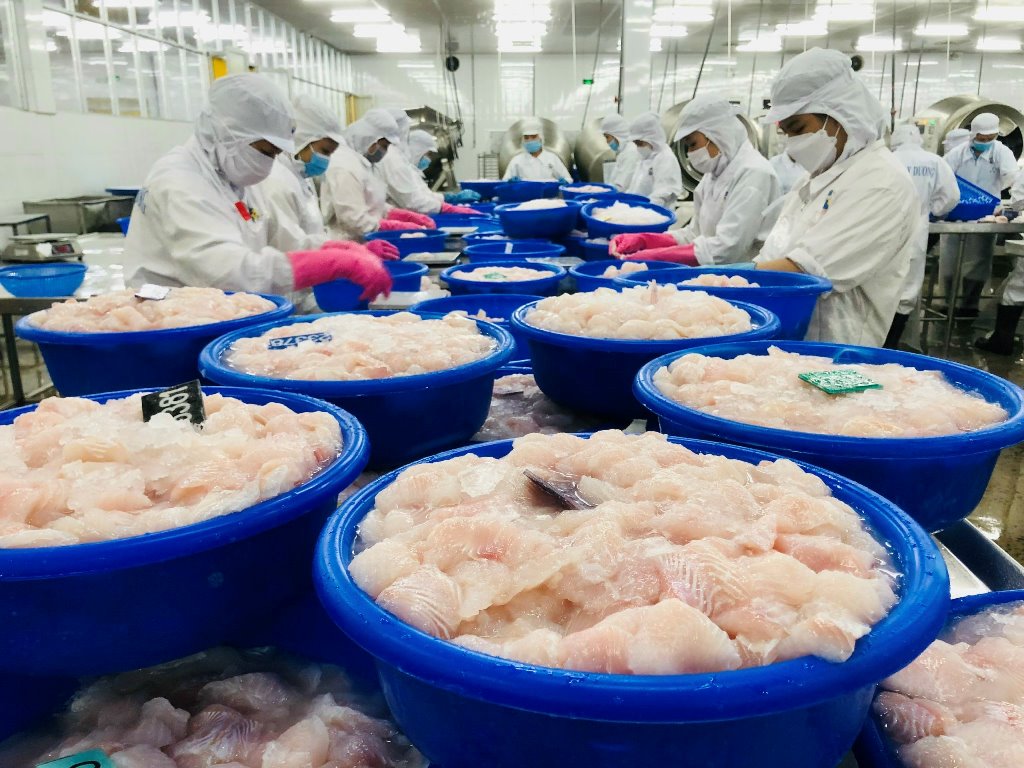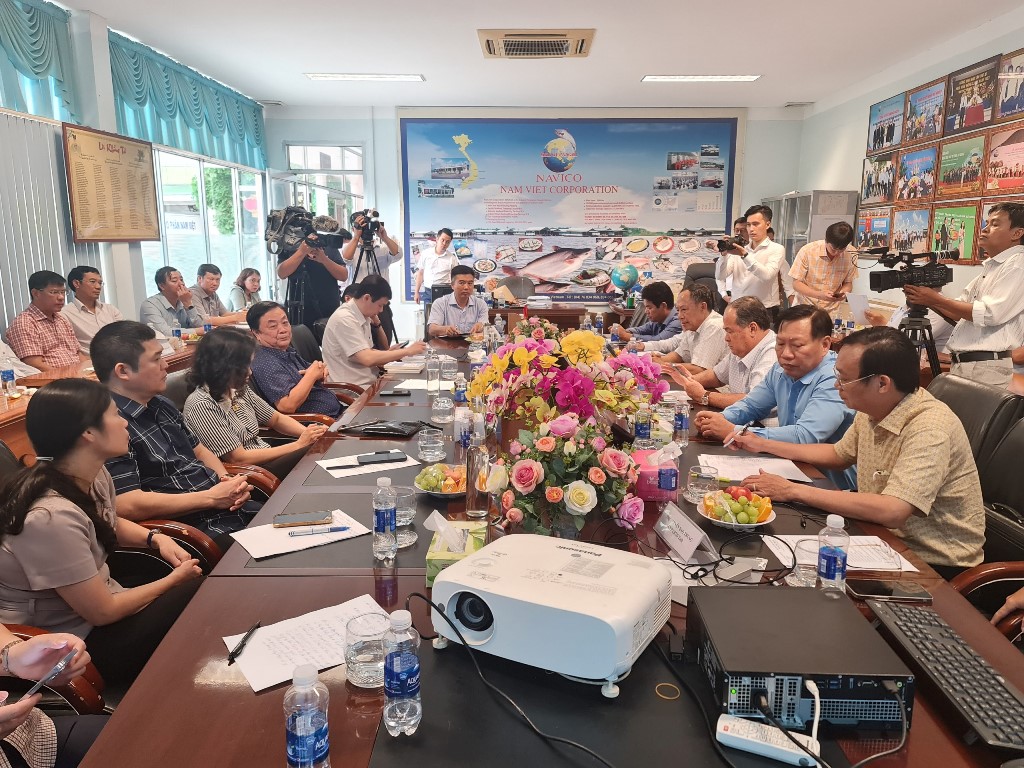The company is making an effort.
As one of the leading pangasius export businesses in the Mekong Delta, Nam Viet Joint Stock Company (JSC) is striving to enhance the value of this endemic fish species, in addition to its main product: fish meat. According to Doan Toi, General Director of Nam Viet JSC, in 2022, Nam Viet completed and put into operation the AMICOGEN factory with a capacity of 800,000 tons of finished collagen and gelatin products per year. The company is also planning to expand the factory's scale through cooperation to exploit the value of by-products such as pangasius skin and fat.
Despite its best efforts, Nam Viet Joint Stock Company could not escape the impact of the global economic downturn, especially the reduced purchasing power of the market after the COVID-19 pandemic. In 2022, Nam Viet strived to maintain employment for 6,500 workers, producing 110,000 tons of pangasius fish, achieving total revenue of VND 4,935 billion, including export sales of USD 180 million, pre-tax profit of VND 780 billion, after- tax profit of VND 660 billion, and paying VND 179 billion in taxes to the state. This result only reached 78% of the planned target.
In 2023, Nam Viet Joint Stock Company strived to maintain employment for 7,500 workers, produce a total of 130,000 tons of pangasius fish, achieve total revenue of VND 5,700 billion, including export sales of USD 215 million, pre-tax profit of VND 100 billion, and after- tax profit of VND 85 billion. The company also planned and constructed a SURIMI factory with a capacity of 24,000 tons of finished surimi products per year, generating sales of USD 40 million.
Facing difficulties
Setting a target of increased revenue but a sharp decrease in profit compared to 2022, Nam Viet Joint Stock Company anticipated the difficulties of the pangasius export market, especially the post-COVID-19 impacts.
Mr. Doan Toi stated that in his 24 years of experience in pangasius farming, he has never faced such difficulties as the present. While export prices for pangasius have remained low since the beginning of the year, the prices of raw materials for feed production have increased significantly (soybean meal from 9,000 VND/kg to 15,500 VND/kg; rice bran from 4,800 VND/kg to 7,800 VND/kg), driving up the price of raw pangasius to 29,000 - 30,000 VND/kg. Businesses also face additional challenges such as high bank loan interest rates and a recent 3% increase in electricity prices...
In the Thot Not Industrial Park ( Can Tho City), Nam Viet Joint Stock Company invested in road construction, but the industrial park still charges fees. Nam Viet's seafood processing plant invested millions of USD in a wastewater treatment system. Although the treated wastewater meets Class A standards (enough for discharge into the environment), it is forced to connect to the industrial park's wastewater system and pay a second wastewater treatment fee of 7,488 VND/m³.
Four years ago, Nam Viet Joint Stock Company invested in a 600-hectare high-tech aquaculture project in Chau Phu district. However, the administrative procedures for converting the land use from rice cultivation to aquaculture have not yet been completed. The reason is that the Ministry of Agriculture and Rural Development (MARD) has not yet reached an agreement with the Ministry of Natural Resources and Environment (MONRE).
Find the bright spot.
Leading the government delegation to An Giang province, Minister of Agriculture and Rural Development Le Minh Hoan selected Nam Viet Joint Stock Company as one of two enterprises to survey and work with (along with Loc Troi Group Joint Stock Company), because pangasius is a key product of the Mekong Delta, making a significant contribution to Vietnam's export turnover. Resolving difficulties for Nam Viet also paves the way for the overall development of the pangasius industry.
To date, the Ministry of Natural Resources and Environment has not issued specific regulations for wastewater from aquaculture, so environmental impact assessments for pangasius farming projects are required to be based on QCVN 40:2011/BTNMT, which is the national technical standard for industrial wastewater.
According to Tran Anh Thu, Vice Chairman of the An Giang Provincial People's Committee, based on regulations, the total coliforms discharged into the environment from Nam Viet's aquaculture area constitutes a violation. However, in reality, the coliform content of the incoming water source (river water) is twice as high as that of the wastewater discharged from the aquaculture area, meaning the company has already treated the water to reduce the coliform levels. "Based on the company's request, the Provincial People's Committee will adjust the administrative penalty decision, removing the penalty related to the coliforms index," Mr. Thu emphasized.
Meanwhile, Director of the Department of Natural Resources and Environment Nguyen Viet Tri stated that for seafood processing plants that have invested in wastewater treatment systems meeting Class A standards, they are permitted to discharge wastewater into the environment without connecting to the industrial park's wastewater system; therefore, requiring connection is unnecessary. Regarding Nam Viet's 600-hectare high-tech aquaculture project in Chau Phu district, relevant agencies are expediting procedures to support the enterprise in converting land use purposes, facilitating investment and production development.
Sharing the difficulties faced by Nam Viet Joint Stock Company in particular, and seafood businesses in general, Minister of Agriculture and Rural Development Le Minh Hoan suggested that businesses need to calmly respond to market fluctuations and the global geopolitical and geoeconomic situation. This includes researching new models suitable to market trends; reorganizing production and business to better adapt; and exploring additional value-added products from pangasius fish…
The challenges facing the pangasius industry are only temporary because, with the increasing demand for food in the future, the world will still need pangasius products – a food that is affordable, highly nutritious, easy to use, and popular with consumers.
During a meeting with U.S. Consul General in Ho Chi Minh City Susan Burns, Chairman of the People's Committee of An Giang province Nguyen Thanh Binh stated that An Giang is the "cradle" of pangasius farming, processing, and export, and requested the U.S. Consul General to act as a bridge to further promote An Giang pangasius products to this vast market. In the context of a shortage of whitefish supply from Russia and some other countries, it is predicted that U.S. seafood demand is likely to recover from the second half of 2023 due to cooling inflation, reduced inventory, and increased purchasing power. Meanwhile, the EU, China, and other countries are also increasing imports of Vietnamese pangasius due to its competitive price, which can replace some of the seafood products currently in short supply. |
NGO CHUAN
Source link






![[Photo] Portraits of the 19 members of the Politburo of the 14th Party Congress](/_next/image?url=https%3A%2F%2Fvphoto.vietnam.vn%2Fthumb%2F1200x675%2Fvietnam%2Fresource%2FIMAGE%2F2026%2F01%2F23%2F1769161873355_z7460119485980-304d85fe10d12298f1db614b0d2aa6bc-jpg.webp&w=3840&q=75)

![[Photo] The Politburo, the Secretariat, and the Central Committee are introduced at the Congress.](/_next/image?url=https%3A%2F%2Fvphoto.vietnam.vn%2Fthumb%2F1200x675%2Fvietnam%2Fresource%2FIMAGE%2F2026%2F01%2F23%2F1769156522913_11.jpeg&w=3840&q=75)



























































































Comment (0)